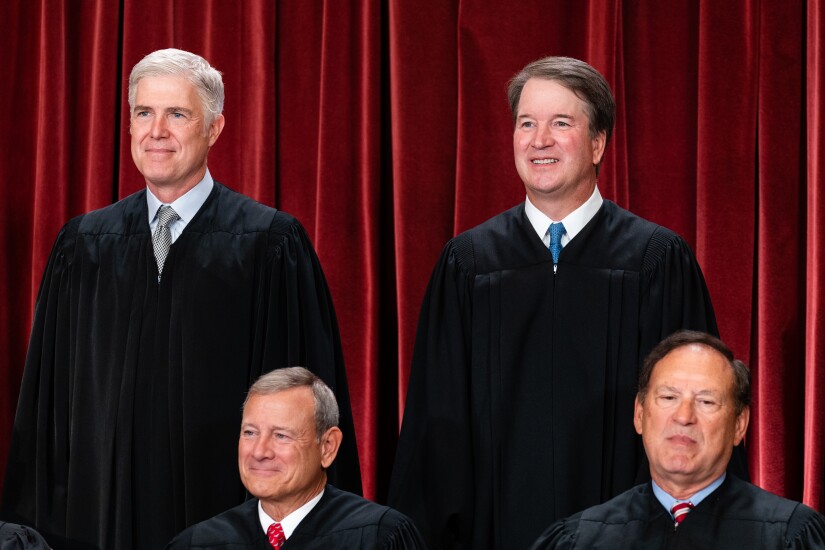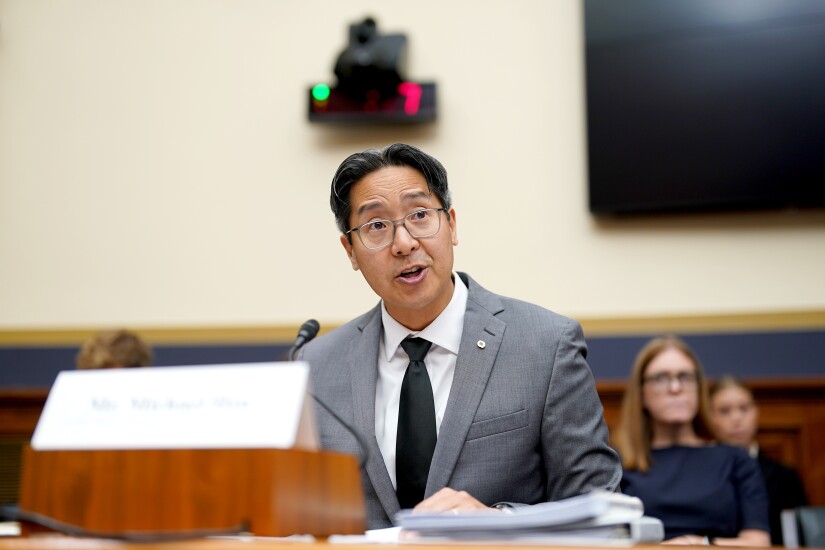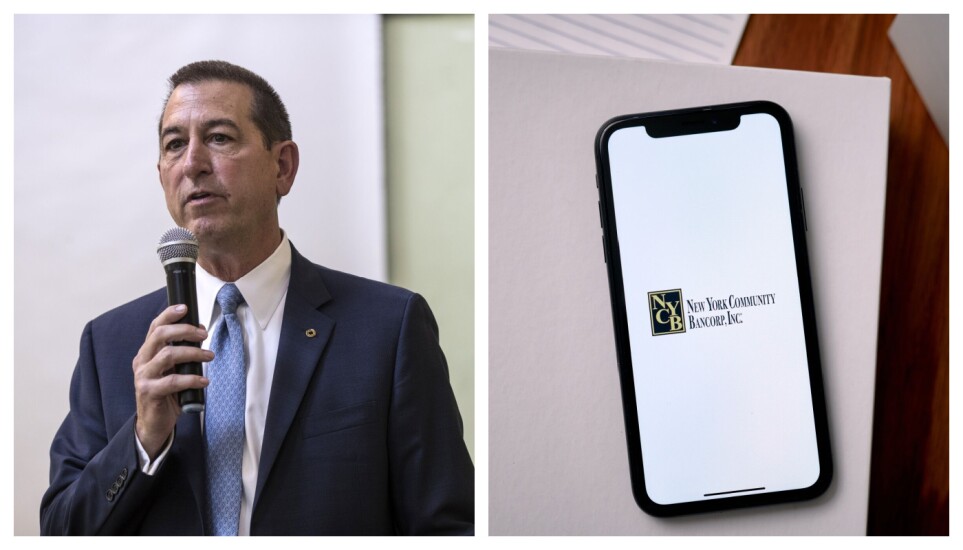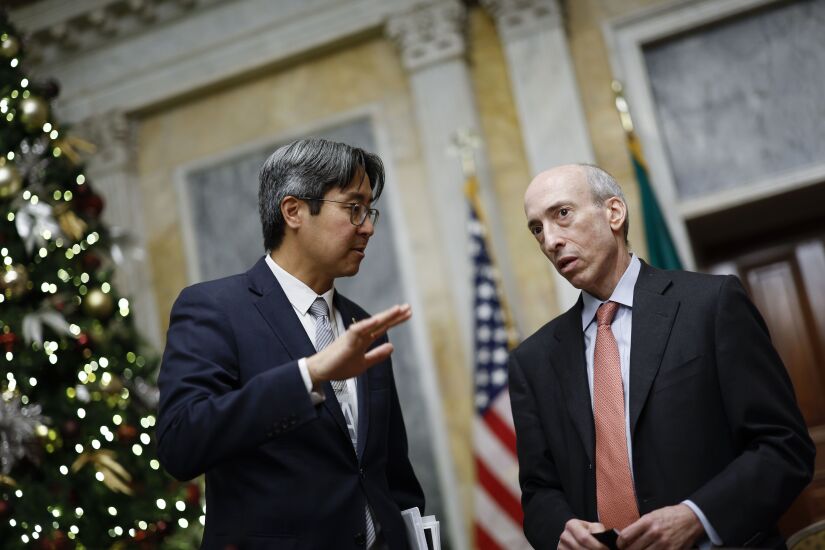In this month's roundup of top banking news: a cease-and-desist order from the Federal Reserve, CRE concerns, increased turnover among bank CFOs and more.

Supreme Court ends Chevron deference in landmark decision
The 40-year-old legal doctrine — known as Chevron deference, named for the 1984 Supreme Court decision in Natural Resources Defense Council v. Chevron establishing the precedent — had long frustrated companies in regulated industries because it limited their ability to sue agencies over their interpretations of broad or vague legal authorities.
The doctrine often meant that regulators could write broader, more costly rules than regulated companies believed were warranted. Its demise is expected to open the floodgates to a wave of litigation challenging such rules.
But the end of Chevron deference could be a double-edged sword for banks, according to industry lawyers, because the Supreme Court's decision will also make it easier for advocacy groups and state attorneys general to challenge rules they oppose, which would introduce more uncertainty for banks.

Synapse bankruptcy puts bank-fintech partnerships on notice
On June 14, the Federal Reserve

Regional banks are locked in a battle of perception over CRE
As banks begin to report second-quarter earnings, many institutions with outsized CRE portfolios will seek to share enough information to convey stability without getting so deep in the weeds that they put investors on alert or break confidentiality agreements.
Jon Winick, CEO of the bank advisory firm Clark Street Capital, said there are reasons to worry about commercial real estate, but that data from banks' earnings reports don't jibe with a doomsday story.
"Now, the apocalyptic narrative could be completely accurate," Winick said. "But you have to concede that there is a difference between the actual facts on the ground, what banks have seen so far in non-performing assets and what the market perception is."

Turnover time: Why so many banks have CFO vacancies
"There has definitely been an uptick" in bank CFO turnover, said Scott Simmons, co-managing partner at Crist|Kolder Associates, a Chicago-area executive search firm that places CEOs, CFOs and other C-suite executives in banking and other industries. "There are no obvious patterns as to why … but what I can tell you is there's immense pressure on these banks, and there's a lot of pressure on the management team to either perform or buy, or be bought."
CFOs play a big role at banks. They are often viewed as the No. 2 executive — in charge of financial planning, cash flow, budget and various investments. They deal with regulators, analysts and investors, and they take center stage during quarterly earnings calls.
The departures of CFOs are impacting companies other than just banks. CFO turnover has been rising among all public companies since 2019, and it hit a three-year high during the first quarter of this year, according to a report from Russell Reynolds Associates, a management consulting firm.

Truist suffers data breach, hackers claim it affects 65,000 employees
"In October 2023, we experienced a cybersecurity incident that was quickly contained," a spokesperson for Truist said. "In partnership with outside security consultants, we conducted a thorough investigation, took additional measures to secure our systems, and notified a small number of clients last fall."
The spokesperson did not say who was behind the breach, how it occurred nor whether the thieves demanded a ransom payment. The Truist spokesperson did not acknowledge the threat actor's claim of having source code or employee data, except to say that the bank was "providing awareness to teammates."

Fed hits Synapse partner Evolve Bank with cease-and-desist order
Evolve was one of the primary banking partners of Synapse, a middleware provider that sought to serve as a bridge between licensed banks and nonbank entities looking to take deposits and make loans. Synapse abruptly shut down and filed for bankruptcy protection in April, freezing numerous transactions and leaving $85 million of customer deposits unaccounted for, according to the firm's Chapter 11 bankruptcy proceedings.
The Fed noted that the action, which was issued in conjunction with the Arkansas State Banking Department on June 11, was made independent of the bankruptcy proceedings.

U.S. Bank announces partnership with Greenlight to provide family app
Consumers with eligible U.S. Bank checking accounts can gain free access to Greenlight's platform and linked debit cards for children and teenagers up to 17 years old. The collaboration is the latest product tied to the launch of the institution's
"Families were looking for a better way to raise financially smart kids [and] we found that age-appropriate financial literacy, paired with a debit card to put the skills into practice, is a powerful way to meet that need," said Jennifer Miller, head of strategic alliances and campus banking at U.S. Bank. "Greenlight has revolutionized how parents teach their kids and teens about money, and we wanted to bring that to our customers in a simple and seamless experience."

NYCB's new leaders face skeptical shareholders in wake of turmoil
Shareholders questioned the new executive management team, suggesting some discontent in the wake of the capital influx. One shareholder wanted to know why investors should sign off on the additional capital, which came from an investment group led by former Trump administration Treasury Secretary Steven Mnuchin. Although the capital infusion was announced March 6 and closed six days later, New York Community was
"If the capital raise was not ready to go specifically that afternoon, the chances of the company surviving would have been at a peril," CEO Joseph Otting told shareholders during the meeting. "As we look back today, it was the right decision for the company, it was the right decision for the investors, and collectively we will work very hard to reestablish the value of this company going forward."

U.S. Bancorp splits new president's former duties between two executives
Stephen Philipson is now leading all of the product businesses within
Philipson, who joined
La Forgia, who has been with

Regulators are laying the groundwork to rein in private credit
The Financial Stability Oversight Council — a regulatory body created by the Dodd-Frank Act composed of the heads of nine federal financial regulators — pointed to the sector's lending to high-risk borrowers and its links to banks as potential sources of financial instability in a May 2023 report. The council stopped short of demanding regulatory action, suggesting instead that the group enhance its data collection on nonbank lending to nonfinancial businesses.
Industry experts say the likelihood of FSOC taking action is low in an election year, but that another Biden term could give the group time to pursue such risks.
"If Biden remains in office, I think you will see continued statements of concern from Democratic regulators," said Ian Katz of Capital Alpha Partners. "In a second term the FSOC would have four years to do something, so I think there's a good chance of some kind of measure by FSOC, perhaps a designation of some private credit-related activity as potentially systemic."

Bank stocks among those that plunged 99% due to NYSE glitch
The stock exchange, which is owned by Intercontinental Exchange, said a technical issue with industrywide price bands published by the Consolidated Tape Association led to the halts. The association oversees the dissemination of real-time trade and quote information for NYSE and other regional stock exchanges. The association has had 100% system availability in 17 of the last 20 quarters, according to





